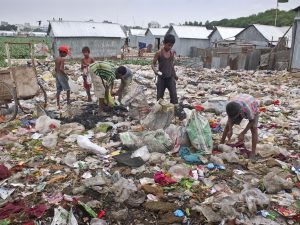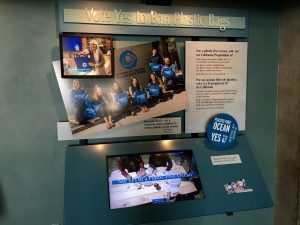 In the Summer of 1998, record level monsoons led to widespread flooding across Bangladesh, India, and Nepal. The floods were responsible for over 500 deaths and left more than half a million people homeless. Crops were destroyed, impacting the health and livelihood of thousands more over the coming months. When the immediate crisis was over, and the floodwaters began to recede, Bangladesh noted a problem that contributed to the destruction. Thin, polythene plastic bags used to carry groceries and retail items home from stores were clogging hundreds of drainage systems across the country, causing an estimated 80% of the drainage issues in its cities. The government implemented a ban on all plastic shopping bags across the nation in January 2002.
In the Summer of 1998, record level monsoons led to widespread flooding across Bangladesh, India, and Nepal. The floods were responsible for over 500 deaths and left more than half a million people homeless. Crops were destroyed, impacting the health and livelihood of thousands more over the coming months. When the immediate crisis was over, and the floodwaters began to recede, Bangladesh noted a problem that contributed to the destruction. Thin, polythene plastic bags used to carry groceries and retail items home from stores were clogging hundreds of drainage systems across the country, causing an estimated 80% of the drainage issues in its cities. The government implemented a ban on all plastic shopping bags across the nation in January 2002.
 Other countries have followed suit with nationwide polythene bag bans, including China, Kenya, France, and Rwanda. Taiwan took it a step further in 2017, implementing a ban on all plastic bags, straws, cups, and utensils. In all, 32 countries have nationwide bans on the manufacture, sale, use, and distribution of plastic bags. 18 of these countries are in Africa. The reasons are similar to why Bangladesh began the ban. Plastic bags account for a tremendous amount of storm drain blockage and the majority of plastic waste pollution across the world. Since Rwanda implemented its plastic bag ban in 2006, flooding has been reduced, and a new micro economy has been created, as many small, women-owned businesses now create reusable bags for sale. The impact to tourism has been felt as well. Rwanda is now considered the cleanest country in Africa, if not the world.
Other countries have followed suit with nationwide polythene bag bans, including China, Kenya, France, and Rwanda. Taiwan took it a step further in 2017, implementing a ban on all plastic bags, straws, cups, and utensils. In all, 32 countries have nationwide bans on the manufacture, sale, use, and distribution of plastic bags. 18 of these countries are in Africa. The reasons are similar to why Bangladesh began the ban. Plastic bags account for a tremendous amount of storm drain blockage and the majority of plastic waste pollution across the world. Since Rwanda implemented its plastic bag ban in 2006, flooding has been reduced, and a new micro economy has been created, as many small, women-owned businesses now create reusable bags for sale. The impact to tourism has been felt as well. Rwanda is now considered the cleanest country in Africa, if not the world.
 In the United States, plastic bag bans have happened at local levels. San Francisco was the first US city to completely ban plastic bags, passing a law forbidding them in 2007. The entire state of California banned them in 2014. More than 200 cities and towns in the United States have a plastic bag ban, and hundreds more have implemented a special tax on single use polythene bags. The municipalities that have implemented bans and taxes have seen a significant drop in the number of bags used per household. Ireland saw a drop in usage from more than 1,200 bags per household per year to just 14 per year. Since the average polythene bag is used for just 12 minutes but takes 1,000 years to decompose, you can imagine the positive impact this dramatic a reduction in usage has for our environment.
In the United States, plastic bag bans have happened at local levels. San Francisco was the first US city to completely ban plastic bags, passing a law forbidding them in 2007. The entire state of California banned them in 2014. More than 200 cities and towns in the United States have a plastic bag ban, and hundreds more have implemented a special tax on single use polythene bags. The municipalities that have implemented bans and taxes have seen a significant drop in the number of bags used per household. Ireland saw a drop in usage from more than 1,200 bags per household per year to just 14 per year. Since the average polythene bag is used for just 12 minutes but takes 1,000 years to decompose, you can imagine the positive impact this dramatic a reduction in usage has for our environment.
